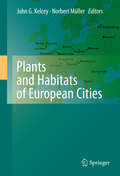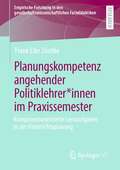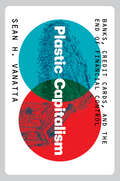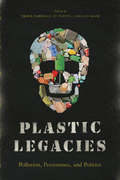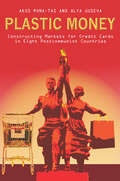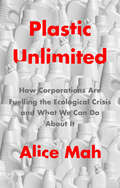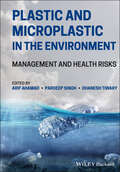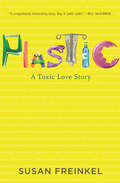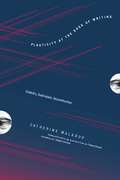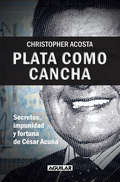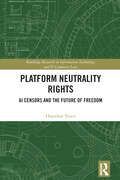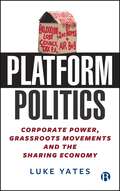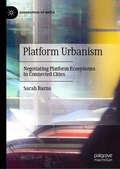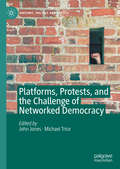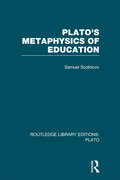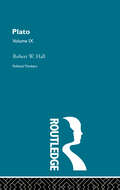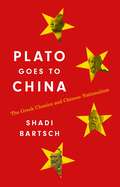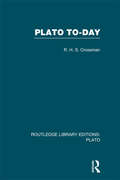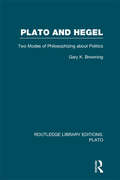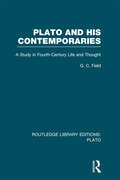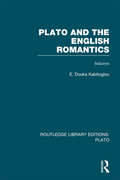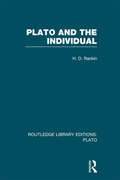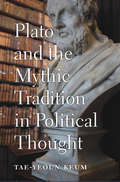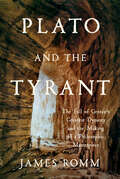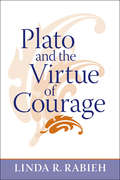- Table View
- List View
Plants and Habitats of European Cities
by John G. Kelcey Norbert MüllerA collection of studies on the ecologies of European cities, including Paris, Zurich, and Amsterdam among others. Discussion includes the natural and historical development of each city, local flora, the environmental impact of city growth, and environmental planning, design, and management.
Planungskompetenz angehender Politiklehrer*innen im Praxissemester: Kompetenzorientierte Lernaufgaben in der Unterrichtsplanung (Empirische Forschung in den gesellschaftswissenschaftlichen Fachdidaktiken)
by Frank Eike ZischkeIn der vorliegenden Studie wird ein Messinstrument zur Erfassung einer politikdidaktischen Planungskompetenz bei angehenden Politiklehrer*innen entwickelt und validiert. Der Fokus liegt auf dem Aspekt der Planung und Entwicklung kompetenzorientierter politischer Lernaufgaben im Verlauf des Praxissemesters von Lehramtsstudierenden im Fach Politik/Sozialwissenschaften. Frank Eike Zischke entwickelt eine Textvignette, die Merkmale einer kompetenzorientierten Planung von politischem Fachunterricht und speziell politischen Lernaufgaben berücksichtigt. Die Resultate der durchgeführten Pilotstudie zeigen, dass sich eine politikdidaktische Planungskompetenz in Abgrenzung zum sozialwissenschaftlichen Professionswissen erheben und modellieren lässt. Zudem deuten die Ergebnisse auf eine Zunahme an Planungskompetenz bei Studierenden im Verlauf des Praxissemester hin. Damit liegen für das Fach Politik/Sozialwissenschaften erstmals evidenzbasierte Ergebnisse zur politikdidaktischen Planungskompetenz im Kontext des Praxissemesters vor.
Plastic Capitalism: Banks, Credit Cards, and the End of Financial Control
by Sean H. VanattaHow bankers created the modern consumer credit economy and destroyed financial stability in the process American households are awash in expensive credit card debt. But where did all this debt come from? In this history of the rise of postwar American finance, Sean H. Vanatta shows how bankers created our credit card economy and, with it, the indebted nation we know today. America&’s consumer debt machine was not inevitable. In the years after World War II, state and federal regulations ensured that many Americans enjoyed safe banks and inexpensive credit. Bankers, though, grew restless amid restrictive rules that made profits scarce. They experimented with new services and new technologies. They settled on credit cards, and in the 1960s mailed out reams of high-interest plastic to build a debt industry from scratch. In the 1960s and &’70s consumers fought back, using federal and state policy to make credit cards safer and more affordable. But bankers found ways to work around local rules. Beginning in 1980, Citibank and its peers relocated their card plans to South Dakota and Delaware, states with the weakest consumer regulations, creating &“on-shore&” financial havens and drawing consumers into an exploitative credit economy over which they had little control. We live in the world these bankers made.
Plastic Legacies: Pollution, Persistence, and Politics
by Ian Shaw Sy Taffel Trisia FarrellyThere is virtually nowhere on earth that remains untouched by plastics and the situation presents a serious threat to our natural world. Despite the magnitude of the problem, the interventions most often put in place are consumer-led and market-based and only nominally capable of addressing the issue. As the problem worsens and neoliberal ideologies limit the world’s responses to this crisis, there is a growing need for legislative frameworks that attend to the complex social and ecological issues associated with plastics. The contributors to this volume bring expertise from across academic disciplines to illustrate how plastics are produced, consumed, and discarded and to find holistic and integrated approaches that demonstrate an understanding of the wide-ranging problem. From the plasticization of earth’s oceans to the endocrine disrupting chemicals that have the potential to seriously harm life as we know it, these essays beg the question that we all must answer: what is our plastic legacy? With contributions by: Imogen E. Napper, Sabine Pahl, Richard C. Thompson, Sasha Adkins, Stephanie B. Borrelle, Jennifer Provencher, Tina Ngata, Sven Bergmann, Christina Gerhardt, Elyse Stanes, Tridibesh Dey, Mike Michael, Laura McLauchlan, Johanne Tarpgaard, Deirdre McKay, Padmapani Perez, Lei Xiaoyu, and John Holland.
Plastic Money: Constructing Markets for Credit Cards in Eight Postcommunist Countries
by Akos Rona-Tas Alya GusevaIn the United States, we now take our ability to pay with plastic for granted. In other parts of the world, however, the establishment of a "credit-card economy" has not been easy. In countries without a history of economic stability, how can banks decide who should be given a credit card? How do markets convince people to use cards, make their transactions visible to authorities, assume the potential risk of fraud, and pay to use their own money? Why should merchants agree to pay extra if customers use cards instead of cash? In Plastic Money, Akos Rona-Tas and Alya Guseva tell the story of how banks overcame these and other quandaries as they constructed markets for credit cards in eight postcommunist countries. We know how markets work once they are built, but this book develops a unique framework for understanding how markets are engineered from the ground up#151;by selecting key players, ensuring cooperation, and providing conditions for the valuation of a product. Drawing on extensive interviews and fieldwork, the authors chronicle how banks overcame these hurdles and generated a desire for their new product in the midst of a transition from communism to capitalism.
Plastic Unlimited: How Corporations Are Fuelling the Ecological Crisis and What We Can Do About It
by Alice MahDespite the global movement to tackle plastic pollution, demand for plastics continues to rise. As the world transitions away from fossil fuels, plastics are set to be the biggest driver of oil demand. Single-use plastics – deemed essential in the fight against COVID-19 – have been given a new lease of life. In a world beset with crisis fatigue, what can we do to curb the escalating plastics crisis? In this book, Alice Mah reveals how petrochemical and plastics corporations have fought relentlessly to protect and expand plastics markets in the face of existential threats to business. From denying the toxic health effects of plastics to co-opting circular economy solutions to plastic waste and exploiting the opportunities offered up by the global pandemic, industry has deflected attention from the key problem: plastics production. The consequences of unfettered plastics growth are pernicious and highly unequal. We all have a part to play in reducing plastics consumption but we must tackle the problem at its root: the capitalist imperative for limitless growth.
Plastic and Microplastic in the Environment: Management and Health Risks
by Pardeep Singh Arif Ahamad Dhanesh TiwaryORGANIC REACTIONS Thought-provoking discussions of the challenges posed by—and potential solutions to—plastic and microplastic pollution In Plastic and Microplastic in the Environment: Management and Health Risks, a team of distinguished environmental researchers delivers an up-to-date exploration of plastic and microplastic environmental contamination, conventional and advanced plastics management techniques, and the policies adopted across the globe to combat the phenomenon of plastics contamination. Containing a balanced focus on both conventional plastics and microplastics, this book discusses the potential health issues related to plastic and microplastic infiltration in a variety of global environments and environmental media, including freshwater environments, oceanic environments, soil and sediment, and air. Insightful treatments of commercial and social issues, including the roles of corporate social responsibility initiatives and general education in the fight against plastic and microplastic pollution, are provided as well. Plastic and Microplastic in the Environment also includes: A thorough introduction to plastic debris in global environments, including its accumulation and disintegration Comprehensive explorations of policies for strengthening recyclable markets around the world Practical discussions of the prevalence of microplastics in the marine environment, air, soil, and other environmental media In-depth examinations of wastewater treatment plants as a potential source point of microplastics, as well as conventional and advanced microplastic particle removal technologies Perfect for academics, postgraduates and advanced undergraduates in fields related to environmental science and plastics, Plastic and Microplastic in the Environment: Management and Health Risks will also earn a place in the libraries of professionals working in the plastics industries and environmental policymakers.
Plastic: A Toxic Love Story
by Susan FreinkelPlastic built the modern world. Where would we be without bike helmets, baggies, toothbrushes, and pacemakers? But a century into our love affair with plastic, we’re starting to realize it’s not such a healthy relationship. Plastics draw on dwindling fossil fuels, leach harmful chemicals, litter landscapes, and destroy marine life. As journalist Susan Freinkel points out in this engaging and eye-opening book, we’re nearing a crisis point. We’ve produced as much plastic in the past decade as we did in the entire twentieth century. We’re drowning in the stuff, and we need to start making some hard choices. Freinkel gives us the tools we need with a blend of lively anecdotes and analysis. She combs through scientific studies and economic data, reporting from China and across the United States to assess the real impact of plastic on our lives. She tells her story through eight familiar plastic objects: comb, chair, Frisbee, IV bag, disposable lighter, grocery bag, soda bottle, and credit card. Her conclusion: we cannot stay on our plastic-paved path. And we don’t have to. Plastic points the way toward a new creative partnership with the material we love to hate but can’t seem to live without.
Plasticity at the Dusk of Writing: Dialectic, Destruction, Deconstruction (Insurrections: Critical Studies in Religion, Politics, and Culture)
by Catherine MalabouA former student and collaborator of Jacques Derrida, Catherine Malabou has generated worldwide acclaim for her progressive rethinking of postmodern, Derridean critique. Building on her notion of plasticity, a term she originally borrowed from Hegel's Phenomenology of Spirit and adapted to a reading of Hegel's own work, Malabou transforms our understanding of the political and the religious, revealing the malleable nature of these concepts and their openness to positive reinvention. In French to describe something as plastic is to recognize both its flexibility and its explosiveness-its capacity not only to receive and give form but to annihilate it as well. After defining plasticity in terms of its active embodiments, Malabou applies the notion to the work of Hegel, Heidegger, Levinas, Levi-Strauss, Freud, and Derrida, recasting their writing as a process of change (rather than mediation) between dialectic and deconstruction. Malabou contrasts plasticity against the graphic element of Derrida's work and the notion of trace in Derrida and Levinas, arguing that plasticity refers to sculptural forms that accommodate or express a trace. She then expands this analysis to the realms of politics and religion, claiming, against Derrida, that "the event" of justice and democracy is not fixed but susceptible to human action.
Plata como cancha: Secretos, impunidad y fortuna de César Acuña
by Christopher AcostaUna exhaustiva investigación periodística que revelan secretos, impunidad y fortuna del político peruano César Acuña Este no es un perfil oficial ni una biografía autorizada. Es más bien la exposición de un proceder, de una conducta. El periodista Christopher Acosta Alfaro escarba en la narrativa que el actual candidato a la presidencia del Perú, César Acuña, ha urdido durante años tanto política como comercialmente. Y demuestra que solo su fortuna ha sido capaz de crear un sistema que compensa atropellos y silencia agraviados. Valiéndose de una exhaustiva investigación que incluye expedientes judiciales y fiscales, resoluciones gubernamentales, informes de inteligencia, acuerdos confidenciales, así como un amplio acceso al círculo más íntimo del político y empresario, el autor de Plata como cancha saca a la luz las piezas de un rompecabezas donde el poder y el dinero se solapan entre sí, en las historias que se cuentan aquí por primera vez. «Si César Acuña no fuera rico —señala Acosta Alfaro en estas páginas—, estaría, muy probablemente, preso».
Platform Neutrality Rights: AI Censors and the Future of Freedom (Routledge Research in Information Technology and E-Commerce Law)
by Hannibal TravisThis book analyzes questions of platform bias, algorithmic filtering and ranking of Internet speech, and declining perceptions of online freedom.Courts have intervened against unfair platforms in important cases, but they have deferred to private sector decisions in many others, particularly in the United States. The First Amendment, human rights law, competition law, Section 230 of the Communications Decency Act, and an array of state and foreign laws address bad faith conduct by Internet platforms or other commercial actors. Arguing that the problem of platform neutrality is similar to the net neutrality problem, the book discusses the assault on freedom of speech that emerges from public-private partnerships. The book draws parallels between U.S. constitutional and statutory doctrines relating to shared spaces and the teachings of international human rights bodies relating to the responsibilities of private actors. It also connects the dots between new rights to appeal account or post removals under the Digital Services Act of the European Union and a variety of fair treatment obligations of platforms under American and European competition laws, “public accommodations” laws, and public utilities laws. Analyzing artificial intelligence (AI) regulation from the point of view of social-media and video-platform users, the book explores overlaps between European and U.S. efforts to limit algorithmic censorship or “shadow-banning”.The book will be of interest to students and scholars in the field of cyberlaw, the law of emerging technologies and AI law.
Platform Politics: Corporate Power, Grassroots Movements and the Sharing Economy
by Luke YatesThe ‘sharing economy’, powered by companies like Airbnb, Uber and Deliveroo, promised to revolutionize the way we work and live. But what changes have come about, and why? This book shows how platform capitalism is not only shaped by business decisions, but is a result of struggles involving social movements, consumer politics and state interventions. It focuses in particular on the controversial tactics used by platform giants to avoid regulation. Drawing on cutting-edge research and analysis, the book provides a critical overview of the struggles around platforms, examines platform power, and reflects on the different possible futures of the platform economy.
Platform Urbanism: Negotiating Platform Ecosystems in Connected Cities (Geographies of Media)
by Sarah BarnsThis book reflects on what it means to live as urban citizens in a world increasingly shaped by the business and organisational logics of digital platforms. Where smart city strategies promote the roll-out of internet of things (IoT) technologies and big data analytics by city governments worldwide, platform urbanism responds to the deep and pervasive entanglements that exist between urban citizens, city services and platform ecosystems today. Recent years have witnessed a backlash against major global platforms, evidenced by burgeoning literatures on platform capitalism, the platform society, platform surveillance and platform governance, as well as regulatory attention towards the market power of platforms in their dominance of global data infrastructure. This book responds to these developments and asks: How do platform ecosystems reshape connected cities? How do urban researchers and policy makers respond to the logics of platform ecosystems and platform intermediation? What sorts of multisensory urban engagements are rendered through platform interfaces and modalities? And what sorts of governance challenges and responses are needed to cultivate and champion the digital public spaces of our connected lives.
Platforms, Protests, and the Challenge of Networked Democracy (Rhetoric, Politics and Society)
by John Jones Michael TriceThis book examines the recent evolution of online spaces and their impact on networked democracy. Through an illuminating mix of theoretical and methodological analysis, contributors provide an understanding of how a range of individuals and groups, including activists and NGOs, governments and griefers, are using digital technologies to influence public debates. Contributions consider these phenomena in a global contemporary context, providing within the same volume rigorous examinations of the design of digital platforms for deliberation, users’ attempts to manipulate those platforms, and the ways activists and governments are responding to emerging threats to democratic discourse. Providing diverse, global case studies, this collection is a valuable tool for academics within and beyond the fields of new media, communication, and information policy and governance.
Plato 's Metaphysics of Education (Routledge Library Editions: Plato)
by Samuel ScolnicovThis volume provides a comprehensive, learned and lively presentation of the whole range of Plato’s thought but with a particular emphasis upon how Plato developed his metaphysics with a view to supporting his deepest educational convictions. The author explores the relation of Plato’s metaphysics to the epistemological, ethical and political aspects of Plato’s theory of education and shows how Plato’s basic positions bear directly on the most fundamental questions faced by contemporary education.
Plato (Political Thinkers Ser. #Vol. 9)
by Robert HallFirst published in 1981 this unique study discusses the evolution of Plato's thought through the actual developments in Athenian democracy, the book also demonstrates Plato's continuing responses to changes in political theory and argues for a new understanding of Plato's goals for the state and his ultimate concern for the moral well-being of the citizens.
Plato Goes to China: The Greek Classics and Chinese Nationalism
by Shadi BartschThe surprising story of how Greek classics are being pressed into use in contemporary China to support the regime’s political agendaAs improbable as it may sound, an illuminating way to understand today’s China and how it views the West is to look at the astonishing ways Chinese intellectuals are interpreting—or is it misinterpreting?—the Greek classics. In Plato Goes to China, Shadi Bartsch offers a provocative look at Chinese politics and ideology by exploring Chinese readings of Plato, Aristotle, Thucydides, and other ancient writers. She shows how Chinese thinkers have dramatically recast the Greek classics to support China’s political agenda, diagnose the ills of the West, and assert the superiority of China’s own Confucian classical tradition.In a lively account that ranges from the Jesuits to Xi Jinping, Bartsch traces how the fortunes of the Greek classics have changed in China since the seventeenth century. Before the Tiananmen Square crackdown, the Chinese typically read Greek philosophy and political theory in order to promote democratic reform or discover the secrets of the success of Western democracy and science. No longer. Today, many Chinese intellectuals use these texts to critique concepts such as democracy, citizenship, and rationality. Plato’s “Noble Lie,” in which citizens are kept in their castes through deception, is lauded; Aristotle’s Politics is seen as civic brainwashing; and Thucydides’s criticism of Athenian democracy is applied to modern America.What do antiquity’s “dead white men” have left to teach? By uncovering the unusual ways Chinese thinkers are answering that question, Plato Goes to China opens a surprising new window on China today.
Plato Today (Routledge Library Editions: Plato)
by R H CrossmanPlato was born around 2,500 years ago. He lived in a small city-state in Greece and busied himself with the problems of his fellow Greeks, a people living in scattered cities around the Mediterranean and the Black Sea. In all he tried to do for the Greeks he failed. Why, then, should people in the modern world bother to read what he had to say? Does it make sense to go to a Greek thinker for advice on the problems of an age so different from his own? To anyone who has questioned the relevance of Plato to the modern world Richard Crossman’s lively book provides a brilliant reply. The problems facing Plato’s world bear striking parallels to ours today, the author maintains, so who better to turn to than Plato, the most objective and most ruthless observer of the failures of Greek society. Crossman’s engaging text provides both an informed introduction to Greek ideas and an original and controversial view of Plato himself.
Plato and Hegel: Two Modes of Philosophizing about Politics (Routledge Library Editions: Plato)
by Gary BrowningHegel and Plato are united as political theorists by the convergence of their philosophical aspirations. But their political writings manifest the general disparities involved in their particular ways of seeking to fulfil these aspirations. Professor Browning compares the political thought of Plato and Hegel by locating their political theorizing within the context of their divergent modes of philosophizing.
Plato and His Contemporaries: A Study in Fourth Century Life and Thought (Routledge Library Editions: Plato)
by G C FieldThis book helps understand Plato’s writings by describing the circumstances in which they were produced. The author begins with an account of Plato’s life and development and a brief analysis of some of the more difficult points arising from the criticism of Plato’s writings. The remainder of the work considers the total setting – political, literary and philosophical – in which Plato’s writings were produced. There are extensive appendices on the Platonic Epistles, Aristotle and the Theory of Ideas, and on the post-Aristotelian tradition. The result is both a lucid account of Plato himself and a comprehensive view of culture in fifth century Greece.
Plato and the English Romantics (Routledge Library Editions: Plato)
by E Douka KabitoglouThis book tackles the problematic relationship between Platonic philosophy and Romantic poetry, between the intellect and the emotions. Drawing on contemporary critical theory, especially hermeneutics and deconstruction, the author shows that a dialogue between thinking and poetizing is possible. The volume yields many new insights into both Platonic and Romantic texts and forms an important work for scholars and students of Greek philosophy, Romantic literature and critical theory.
Plato and the Individual (Routledge Library Editions: Plato)
by David RankinThis book explores the life-history of the individual within the context of Plato’s social thought. The author examines Plato’s treatment of the principal crises in an individual life - birth, educational selection, sex, the individual’s contract with society, old age, death, and life after death – and provides an unprecedented analysis of Plato’s theory of genetics as it appears in the Timaeus. Comparisons are made with contemporary developments in anthropology, sociology, and comparative myth but without losing sight of the fact that Plato, whilst having much to say to the modern world, was not a modern.
Plato and the Mythic Tradition in Political Thought
by Tae-Yeoun KeumAn ambitious reinterpretation and defense of Plato’s basic enterprise and influence, arguing that the power of his myths was central to the founding of philosophical rationalism.Plato’s use of myths—the Myth of Metals, the Myth of Er—sits uneasily with his canonical reputation as the inventor of rational philosophy. Since the Enlightenment, interpreters like Hegel have sought to resolve this tension by treating Plato’s myths as mere regrettable embellishments, irrelevant to his main enterprise. Others, such as Karl Popper, have railed against the deceptive power of myth, concluding that a tradition built on Platonic foundations can be neither rational nor desirable.Tae-Yeoun Keum challenges the premise underlying both of these positions. She argues that myth is neither irrelevant nor inimical to the ideal of rational progress. She tracks the influence of Plato’s dialogues through the early modern period and on to the twentieth century, showing how pivotal figures in the history of political thought—More, Bacon, Leibniz, the German Idealists, Cassirer, and others—have been inspired by Plato’s mythmaking. She finds that Plato’s followers perennially raised the possibility that there is a vital role for myth in rational political thinking.
Plato and the Tyrant: The Fall of Greece's Greatest Dynasty and the Making of a Philosophic Masterpiece
by James RommFrom an eminent historian and classicist, an incisive portrait of the philosopher Plato, showing how the ideas in his masterwork, Republic, were tested by violent events in the most powerful Greek city of the era. Plato is one of history’s most influential thinkers, the “sublime philosopher” whose writings remain foundational to Western culture. He is known for the brilliant dialogues in which he depicted his teacher, Socrates, discussing ethical truths with prominent citizens of Athens. Yet the image we have of Plato—an ethereal figure far removed from society and politics, who conjured abstract ideas in peaceful groves—is a fiction, created by Plato’s admirers and built up over centuries. In fact, Plato was very much a man of the world. In Plato and the Tyrant, acclaimed historian and classicist James Romm draws on personal letters of Plato—documents that have long been kept in obscurity—to show how a philosopher helped topple the leading Greek power of the era: the opulent city of Syracuse. There, Plato encountered two authoritarian rulers, a father and son both named Dionysius, and tried to steer them toward philosophy. At the same time, he worked on his masterpiece, Republic, in which he conceived a ruler who unites perfect wisdom with absolute power. That dream has echoed down through the ages and given rise to a famous term, one that Plato himself didn’t actually use: philosopher-king. As Romm reveals, Plato’s time in Syracuse helped shape Republic—and also had disastrous results for Plato himself and for all of Greek Sicily. The younger Dionysius, emotionally unstable but intellectually curious, welcomed Plato with open arms, but soon the relationship soured. Plato’s close friendship with Dionysius’s uncle, Dion—possibly a bond of romantic love—created a rift in the ruling family that led to a chaotic civil war. Combining thrilling political drama with explorations of Plato’s most cherished ideas, Romm takes us into the heart of Greece’s late classical age, a time when many believed that democracy had failed. Plato’s search for solutions led him to write his fervent plea for a new political order, and also led him to a place where he believed his theories might be put into practice. But Plato and the Tyrant demonstrates how Plato’s experiment with enlightened autocracy spiraled into catastrophe, and also gives us nothing less than a new account of the origins of Western political thought.
Plato and the Virtue of Courage
by Linda R. RabiehWinner of the first Delba Winthrop Mansfield Award for Excellence in Political SciencePlato and the Virtue of Courage canvasses contemporary discussions of courage and offers a new and controversial account of Plato's treatment of the concept. Linda R. Rabieh examines Plato's two main thematic discussions of courage, in the Laches and the Republic, and discovers that the two dialogues together yield a coherent, unified treatment of courage that explores a variety of vexing questions: Can courage be separated from justice, so that one can act courageously while advancing an unjust cause? Can courage be legitimately called a virtue? What role does wisdom play in courage? What role does courage play in wisdom? Based on Plato's presentation, Rabieh argues that a refined version of traditional heroic courage, notwithstanding certain excesses to which it is prone, is worth honoring and cultivating for several reasons. Chief among these is that, by facilitating the pursuit of wisdom, such courage can provide a crucial foundation for the courage most deserving of the name.
